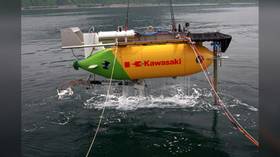Plastic battery that can withstand deep-sea pressures and RESIST FIRE is tested on Japanese mini-sub

Japanese firm Sanyo Chemical Industries is testing a rechargeable battery made entirely of plastic on board an unmanned submarine. Cheaper than lithium batteries to produce, they say it can withstand intense heat and depths.
The battery, which has electrolytes made from resin and lasts twice as long as traditional lithium batteries, has much greater resistance to fires and is cheaper to make. Sanyo Chemical Industries claims that it costs 90 percent less to produce than older batteries, due to the simplicity of its production process.
The chemical company says that the new type of battery should give the Kawasaki submarines an operating range of 16 hours.
Also on rt.com Russian and German scientists develop ‘sodium sandwich’ that could replace lithium batteriesBecause of the nature of the unmanned submarine’s work, a plastic battery is preferable due to the fact it can withstand depths of more than 3,000 meters. Being fire-resistant is another crucial element.
Lithium batteries, meanwhile, have been known to explode and cause fires. In January, a very large container ship was delayed for several days following a blaze caused by an exploding lithium battery. With plastic batteries, this risk is mitigated due to their flame-retardant properties.
Full scale production of the all-polymer battery is expected to commence in the autumn.
Like this story? Share it with a friend!














